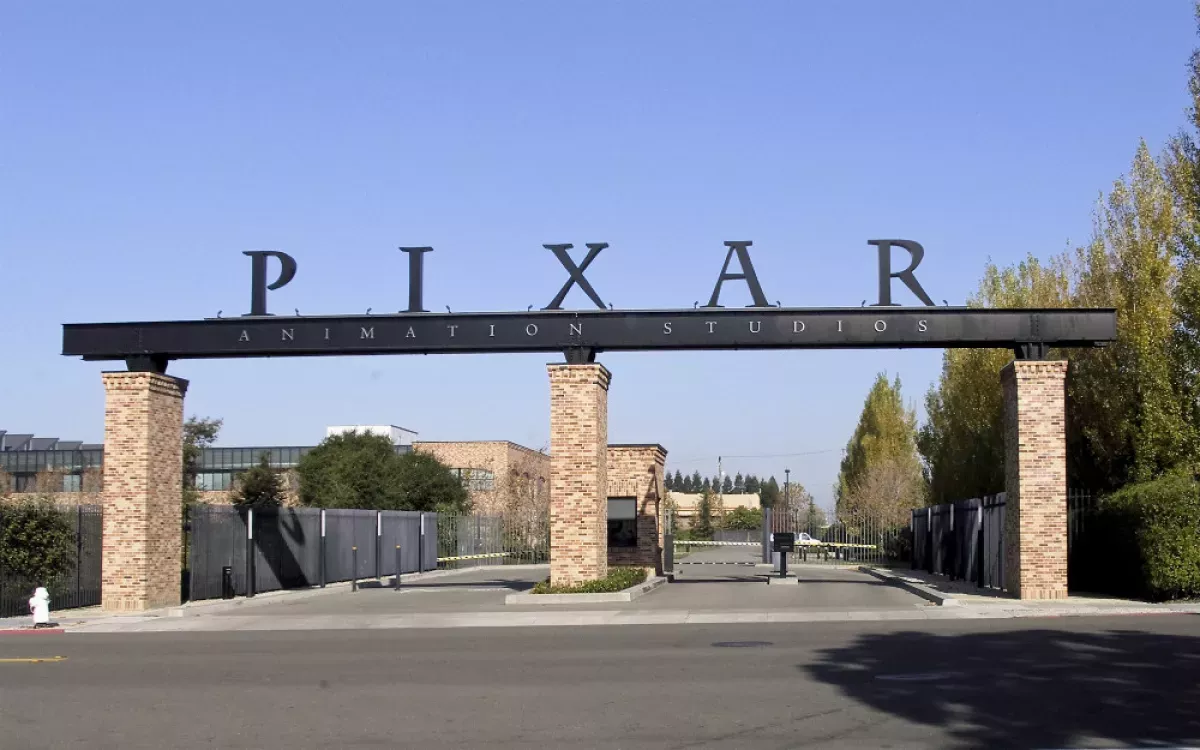Pixar Animation Studios, based in Emeryville, California, is renowned for its groundbreaking computer-animated feature films, achieving both critical acclaim and commercial success. It operates as a subsidiary of Walt Disney Studios, which is part of the larger Walt Disney Company. Pixar's innovative approach to animation has significantly impacted the film industry, setting new standards for storytelling and visual artistry in animated movies.
1973: Steve Jobs first job at Atari
In 1973, Steve Jobs's first job was under Nolan Bushnell as a technician at Atari.
1974: Establishment of Computer Graphics Lab (CGL)
In 1974, Alexander Schure, the founder of New York Institute of Technology (NYIT), established the Computer Graphics Lab (CGL) to create the world's first computer-animated film.
1976: Bushnell sold Atari
In 1976, Nolan Bushnell sold Atari to Warner Communications.
1977: Chuck E. Cheese's Pizza Time Theatres company founded
In 1977, Nolan Bushnell founded Chuck E. Cheese's Pizza Time Theatres company (PTT).
1979: Pixar Started as part of Lucasfilm
In 1979, Pixar began as the Graphics Group, a part of Lucasfilm's computer division.
1979: Launch of the Graphics Group at Lucasfilm
In 1979, the Graphics Group was launched at Lucasfilm, with Edwin Catmull in charge after being hired from NYIT. Alvy Ray Smith was made the director of the Graphics Group.
1981: Possible Origin of the name Pixar
According to Michael Rubin, in 1981, Smith and three other employees came up with the name "Pixer", during a restaurant visit. The name was later changed to Pixar
1982: Pixar team began working on special-effects film sequences with Industrial Light & Magic
In 1982, the Pixar team began working on special-effects film sequences with Industrial Light & Magic.
1983: Lucas's divorce
In 1983, Lucas's divorce, which coincided with the sudden dropoff in revenues from Star Wars licenses following the release of Return of the Jedi.
1983: Nolan Bushnell founded Kadabrascope
In 1983, Nolan Bushnell founded Kadabrascope, a new computer-guided animation studio, as a subsidiary of Chuck E. Cheese's Pizza Time Theatres company (PTT).
1983: John Lasseter hired at Lucasfilm
In late 1983, John Lasseter was hired to the Lucasfilm team as an "interface designer" and animated the short film The Adventures of André & Wally B.
1984: Pizza Time Theatres goes Bankrupt
In 1984 Chuck E. Cheese's Pizza Time Theatres company went bankrupt and was acquired by ShowBiz Pizza Place.
1985: Deal with Shogakukan to make Monkey
In 1985 while still at Lucasfilm, they made a deal with the Japanese publisher Shogakukan to make a computer-animated movie called Monkey, based on the Monkey King.
1985: Steve Jobs edged out of Apple
In 1985, Steve Jobs was edged out of Apple.
February 3, 1986: Steve Jobs invests in Pixar
On February 3, 1986, Steve Jobs paid George Lucas $5 million for technology rights and invested $5 million cash as capital into Pixar, joining the board of directors as chairman.
February 1986: Spin out of Pixar as a corporation
In February 1986, the Graphics Group was spun out as a corporation by Catmull and Smith.
May 1986: Pixar signed a contract with Disney
In May 1986 Pixar signed a contract with Disney, who eventually bought and used the Pixar Image Computer and custom software written by Pixar as part of its Computer Animation Production System (CAPS) project, to migrate the laborious ink and paint part of the 2D animation process to a more automated method.
1986: Luxo Jr. Premiered at SIGGRAPH
In 1986, Pixar employee John Lasseter premiered his short demonstration animations, such as Luxo Jr., to great fanfare at SIGGRAPH, the computer graphics industry's largest convention.
1986: Pixar spun off as a corporation
In 1986, the Graphics Group spun off from Lucasfilm to become a corporation called Pixar. Apple co-founder Steve Jobs funded the spin-off, becoming the majority shareholder. Pixar's mascot, Luxo Jr., a desk lamp, was also featured in the studio's short film released in 1986.
1986: Project Monkey continued after becoming separate company
In 1986, the project Monkey continued sometime after they became a separate company, but it became clear that the technology was not sufficiently advanced and was abandoned.
1989: Animation department turned into a division
In 1989, Lasseter's growing animation department, was turned into a division that produced computer-animated commercials for outside companies.
April 1990: Pixar sold its hardware division
In April 1990, Pixar sold its hardware division, including all proprietary hardware technology and imaging software, to Vicom Systems, and transferred 18 of Pixar's employees.
1990: Release of The Rescuers Down Under
The first feature film to be released using the new CAPS animation method was The Rescuers Down Under in 1990.
March 6, 1991: Steve Jobs bought Pixar
On March 6, 1991, Steve Jobs bought Pixar from its employees and became the full owner.
1994: Steve Jobs Considers Selling Pixar
In 1994, Steve Jobs contemplated selling Pixar to Hallmark Cards, Paul Allen, and Larry Ellison before the success of Toy Story led him to reconsider and take a more active leadership role.
November 29, 1995: Pixar's IPO Exceeds Netscape's
On November 29, 1995, Pixar held its initial public offering, which exceeded Netscape's as the biggest IPO of the year. In its first half-hour of trading, Pixar stock shot from $22 to $45, delaying trading because of unmatched buy orders. Shares climbed to US$49 and closed the day at $39.
1995: Toy Story release
By 1995, Pixar made a historic $26 million deal with Disney to produce three computer-animated feature films, the first of which was Toy Story.
July 9, 1996: Pixar Shuts Down Commercial Unit
On July 9, 1996, Pixar announced the closure of its television commercial unit, which had 18 employees, to concentrate on longer projects and interactive entertainment.
November 2000: New Pixar Studio Opens
In November 2000, Pixar opened a new studio at the Emeryville campus, designed by PWP Landscape Architecture, following the success of Toy Story.
January 26, 2001: Failed Agreement with Disney
On January 26, 2001, negotiations between Pixar and Disney for a new distribution agreement failed. Pixar sought control over production, ownership of story rights, and a higher profit share, but Disney found these terms unacceptable.
2001: Inauguration of the Academy Award for Best Animated Feature
Since its inauguration in 2001, eleven Pixar films have won the Academy Award for Best Animated Feature.
July 26, 2002: Failed Agreement with Disney
On July 26, 2002, negotiations between Pixar and Disney for a new distribution agreement failed. Pixar sought control over production, ownership of story rights, and a higher profit share, but Disney found these terms unacceptable.
April 22, 2003: Failed Agreement with Disney
On April 22, 2003, negotiations between Pixar and Disney for a new distribution agreement failed. Pixar sought control over production, ownership of story rights, and a higher profit share, but Disney found these terms unacceptable.
2003: Finding Nemo won the Academy Award for Best Animated Feature
In 2003, Finding Nemo won the Academy Award for Best Animated Feature.
January 16, 2004: Failed Agreement with Disney
On January 16, 2004, negotiations between Pixar and Disney for a new distribution agreement failed. Pixar sought control over production, ownership of story rights, and a higher profit share, but Disney found these terms unacceptable.
July 22, 2004: Failed Agreement with Disney
On July 22, 2004, negotiations between Pixar and Disney for a new distribution agreement failed. Pixar sought control over production, ownership of story rights, and a higher profit share, but Disney found these terms unacceptable.
2004: The Incredibles won the Academy Award for Best Animated Feature
In 2004, The Incredibles won the Academy Award for Best Animated Feature.
2004: Negotiations Cease with Disney
In 2004, disagreements between Steve Jobs and Disney's CEO Michael Eisner caused negotiations to cease. Jobs declared that Pixar was actively seeking partners other than Disney.
January 14, 2005: Failed Agreement with Disney
On January 14, 2005, negotiations between Pixar and Disney for a new distribution agreement failed. Pixar sought control over production, ownership of story rights, and a higher profit share, but Disney found these terms unacceptable.
September 2005: Iger Considers Pixar Acquisition
In September 2005, Bob Iger, while watching a parade at the opening of Hong Kong Disneyland, realized Disney needed to acquire Pixar to revitalize its character lineup, leading to the acquisition discussions.
September 2005: Eisner's Departure Leads to Resumed Negotiations
In September 2005, negotiations between Pixar and Disney resumed following the departure of Michael Eisner from Disney.
November 4, 2005: Cars Release Delayed
The release of Cars was delayed from November 4, 2005, to June 9, 2006, as part of Pixar's strategy during contract negotiations with Disney.
January 2006: Disney announced acquisition of Pixar
In January 2006, Disney announced its acquisition of Pixar.
January 24, 2006: Disney Agrees to Buy Pixar
On January 24, 2006, Disney agreed to buy Pixar for approximately $7.4 billion in an all-stock deal, pending shareholder approval.
May 5, 2006: Disney Completes Pixar Acquisition
On May 5, 2006, the acquisition of Pixar by Disney was completed, making Steve Jobs Disney's largest individual shareholder and giving him a seat on the board of directors.
May 2006: Lasseter reveals Iger wanted to acquire Pixar
After the deal closed in May 2006, Lasseter revealed that Iger had felt that Disney needed to buy Pixar while watching a parade at the opening of Hong Kong Disneyland.
May 2006: Disney Completed Acquisition of Pixar
In May 2006, Disney completed its acquisition of Pixar.
June 9, 2006: Cars Delayed Release
Cars was released on June 9, 2006, after being delayed from November 4, 2005, due to ongoing contract negotiations between Pixar and Disney.
2006: Cars Release
In 2006, Pixar's film Cars was released. It was one of the films Pixar wanted control over in their distribution negotiations with Disney.
2007: Distribution Deal for Ratatouille
In 2007, Pixar and Disney created a distribution deal for the intended release of Ratatouille. The deal was meant to ensure the film's release through Disney's channels if the potential acquisition of Pixar by Disney failed.
2007: Ratatouille won the Academy Award for Best Animated Feature
In 2007, Ratatouille won the Academy Award for Best Animated Feature.
2008: Jim Morris Becomes General Manager of Pixar
In 2008, Jim Morris, producer of WALL-E, became general manager of Pixar, taking charge of the studio's day-to-day operations and products.
2008: Julia Robinson Mathematics Festival Hosted
In 2008, Pixar senior scientist Tony DeRose offered to host the second Julia Robinson Mathematics Festival at the Emeryville campus.
2008: WALL-E won the Academy Award for Best Animated Feature
In 2008, WALL-E won the Academy Award for Best Animated Feature.
2008: Pixar and Disney Animation Maintain Separate Identities
In 2008, after the merger, Lasseter and Catmull ensured that Pixar and Disney Animation maintained separate identities and cultures, with each studio solely responsible for its own projects, exemplified by issues with Ratatouille and Bolt.
February 2009: Pixar Executives Awarded Golden Lion for Lifetime Achievement
In February 2009, Pixar executives John Lasseter, Brad Bird, Pete Docter, Andrew Stanton, and Lee Unkrich were presented with the Golden Lion for Lifetime Achievement at the Venice Film Festival.
2009: Up won the Academy Award for Best Animated Feature
In 2009, Up won the Academy Award for Best Animated Feature and was nominated for the Academy Award for Best Picture.
April 20, 2010: Pixar Canada Opens
On April 20, 2010, Pixar opened Pixar Canada in Vancouver, British Columbia, which produced short films based on Toy Story and Cars.
2010: Toy Story 3 Grossed over $1 Billion
In 2010, Toy Story 3 grossed over $1 billion.
2012: Brave won the Academy Award for Best Animated Feature
In 2012, Brave won the Academy Award for Best Animated Feature.
October 2013: Pixar Canada Closes
In October 2013, Pixar closed its Pixar Canada studio in Vancouver to refocus efforts at its main headquarters.
November 2014: Morris Promoted to President of Pixar
In November 2014, Jim Morris was promoted to president of Pixar, while Andrew Millstein was promoted to president of Disney Animation, both reporting to Catmull.
2015: Inside Out won the Academy Award for Best Animated Feature
In 2015, Inside Out won the Academy Award for Best Animated Feature.
2016: Finding Dory Grossed over $1 Billion
In 2016, Finding Dory grossed over $1 billion.
November 21, 2017: Lasseter Takes Leave of Absence
On November 21, 2017, John Lasseter announced he was taking a six-month leave of absence after acknowledging "missteps" in his behavior with employees.
2017: Coco won the Academy Award for Best Animated Feature
In 2017, Coco won the Academy Award for Best Animated Feature.
June 8, 2018: Lasseter to Leave Disney and Pixar
On June 8, 2018, it was announced that John Lasseter would leave Disney Animation and Pixar at the end of the year, transitioning to a consulting role.
June 15, 2018: Incredibles 2 Released
On June 15, 2018, Incredibles 2 was released, setting a record for widest opening weekend worldwide and domestic for an animated film, eventually grossing $1.2 billion worldwide.
June 19, 2018: Pete Docter Replaces Lasseter
On June 19, 2018, Pete Docter was announced as John Lasseter's replacement as chief creative officer of Pixar.
October 23, 2018: Catmull Announces Retirement
On October 23, 2018, Ed Catmull announced that he would be retiring and stayed in an adviser role until July 2019.
2018: Incredibles 2 Grossed over $1 Billion
In 2018, Incredibles 2 grossed over $1 billion.
January 18, 2019: Lee Unkrich Leaves Pixar
On January 18, 2019, Lee Unkrich left Pixar after 25 years although he would return to the studio a few years later.
June 21, 2019: Toy Story 4 Released
On June 21, 2019, Toy Story 4 was released, surpassing the widest opening worldwide weekend record that Incredibles 2 set and making over $1 billion. The film won the Academy Award for Best Animated Feature.
July 2019: Catmull Retires
In July 2019, Ed Catmull fully retired from his advisory role.
2019: Toy Story 4 Grossed over $1 Billion
In 2019, Toy Story 4 grossed over $1 billion.
March 6, 2020: Onward Released
On March 6, 2020, Pixar released Onward, which underperformed at the box office due to the start of the COVID-19 pandemic.
November 2020: Soul Release Moved
Due to the COVID-19 pandemic, the release of Soul was moved to November 2020, and then ultimately released on December 25, 2020, on Disney+.
December 25, 2020: Soul Released on Disney+
On December 25, 2020, Soul was released on Disney+ at no additional cost to subscribers, becoming the first animated streaming film to win the Academy Award for Best Animated Feature.
2020: Soul Announcement
During the 2019 D23 Expo, Pixar announced that their next film, Soul, would release in 2020.
2020: Soul won the Academy Award for Best Animated Feature
In 2020, Soul won the Academy Award for Best Animated Feature.
June 2021: Luca Released on Disney+
In June 2021, Luca was released free on Disney+.
March 2022: Turning Red Released on Disney+
In March 2022, Turning Red was released free on Disney+.
June 2022: Lightyear Released
In June 2022, Lightyear, Pixar's first movie to return to theaters, was released but became a box-office failure, costing the studio $106 million.
September 2022: Rivera Promoted to Executive VP
In September 2022, Jonas Rivera was promoted to Executive VP of Film Production at Pixar, overseeing all film and streaming production.
December 2022: Disney to Rely More on Pixar Brand
In December 2022, Disney CEO Bob Iger noted that they would rely more on the Pixar brand.
June 2023: Disney Lays Off 75 Employees
In June 2023, Disney laid off 75 employees, including the director of Lightyear, Angus MacLane, and the film's producer, Galyn Susman.
July 2023: Pixar's Films Earned Over $15 Billion
As of July 2023, Pixar's feature films have earned over $15 billion at the worldwide box office.
August 2023: Elemental's Box Office Comeback
By early August 2023, Elemental made a box office comeback, crossing $400 million at the worldwide box office after a disappointing opening weekend.
December 2023: Soul, Turning Red, and Luca to be Released in Theaters
In December 2023, it was announced that Soul, Turning Red, and Luca would be released in theaters in the United States in the first quarter of 2024.
January 2024: Pixar Staff Layoffs Reported
In January 2024, it was reported that Pixar's staff would face imminent layoffs by 20 percent, reducing the studio's workforce to less than 1,000 employees. However, the layoffs were then delayed.
May 2024: Pixar Staff Layoffs Proceed
In May 2024, Pixar proceeded with slightly smaller layoffs: 175 employees or approximately 14 percent of the studio's workforce. The layoffs occurred as the studio began to rely less on direct-to-streaming series and more on feature films intended primarily for theatrical exhibition.
2024: Soul, Turning Red, and Luca to be Released in Theaters
In the first quarter of 2024, it was announced that Soul, Turning Red, and Luca would be released in theaters in the United States.
Mentioned in this timeline
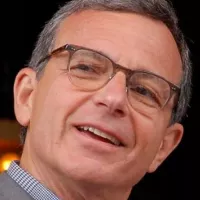
Robert Iger is an American media executive known for his...
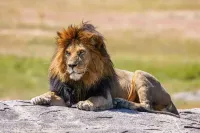
The lion Panthera leo is a large cat species native...
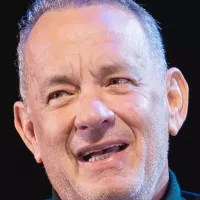
Tom Hanks is a highly acclaimed American actor and filmmaker...
Hong Kong is a Special Administrative Region of the People's...
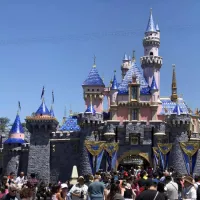
Disneyland located in Anaheim California is the first theme park...
Canada is a North American country the second largest in...
Trending

7 months ago Elise Mertens' boyfriend, Wimbledon 2025 Men's Final: Alcaraz vs Sinner, viewing guide.

3 months ago ATP Almaty Open: Medvedev vs Walton Predictions and Betting Odds, Darderi Mentioned

6 months ago Ryan Reynolds Hints at Deadpool Joining Avengers in Cryptic Instagram Post

3 months ago Upstart's Q3 Earnings: Mixed Results, Soft Q4 Guidance, and Stock Slides After Announcement.
2 months ago Booger McFarland Discusses ACLs and NFL Hot Seats; Kiffin's LSU Move Speculated.

2 months ago Tim Allen Returns to Stand-Up: Fresno Performance at Warnors Theatre Announced
Popular

Thomas Douglas Homan is an American law enforcement officer who...

Martin Luther King Jr was a pivotal leader in the...

XXXTentacion born Jahseh Dwayne Ricardo Onfroy was a controversial yet...

William Franklin Graham III commonly known as Franklin Graham is...

Instagram is a photo and video-sharing social networking service owned...

Jupiter is the fifth and largest planet from the Sun...
